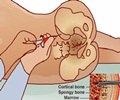
‘Spleen gets highly enlarged in MPN diseased patients. The absence of CDK6 proteins alleviated the symptoms associated with MPN with the spleen shrinking back to its standard size and disease progression is delayed.’
Tweet it Now
MPN patients have so far been treated with ruxolitinib, a JAK2 inhibitor. Ruxolitinib effectively controls the symptoms but does not offer a cure, as the malignant stem cell clone is located in the bone marrow and is generally not attacked. Discontinuing the treatment involves a high risk of relapse or progression to AML, a form of leukemia. Therefore, it is of importance to discover new therapeutic approaches. Significant factor influencing the disease: the protein CDK6 A research team led by Veronika Sexl from Vetmeduni Vienna and Robert Kralovics from CeMM/Medical University of Vienna succeeded in doing just that. Using a mouse model, they identified the protein CDK6 as an important factor influencing the development of JAK2V617F-initiated MPN. "We were able to show that in the absence of CDK6, the proliferation of affected stem cells was reduced and cell death was increased. As a consequence, the absence of CDK6 ameliorated the clinical symptoms and increased life expectancy," says Sexl.
Novel therapeutic approach for MPN patients The absence of CDK6 clearly attenuates the symptoms in the long term. The spleen, greatly enlarged by the disease, shrinks back to its normal size and the progression of the disease is delayed. Kralovics: "CDK6 is a central signalling node that connects cell cycle control; the activation of the protein NFκB, a master regulator of inflammation; apoptosis, which refers to the programmed cellular death; and malignant stem-cell function. Our work indicates that fine-tuning the level of CDK6 influences this mechanism and could potentially improve the quality of life of MPN patients. This opens up the possibility of a completely novel therapeutic approach."
Source-Eurekalert















